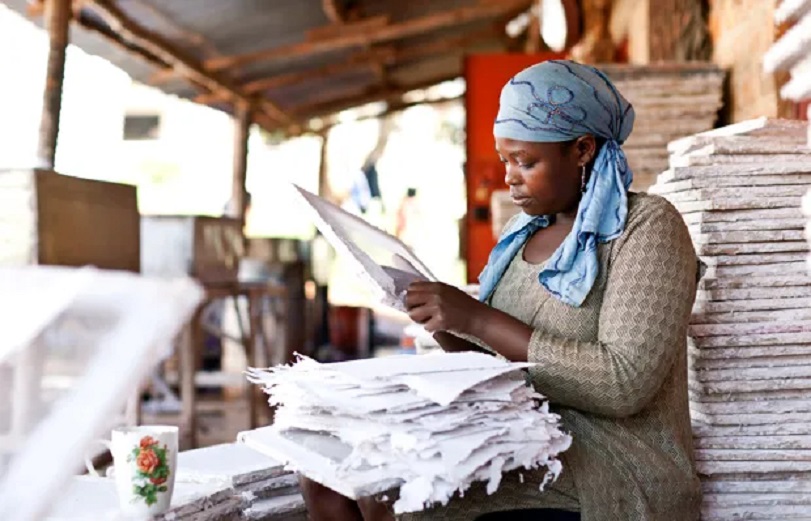Economy
African Exchanges Should Focus on Smaller Businesses


By Nonkululeko Nyembezi-Heita
The African growth story is no longer a fairy tale. Over the past decade multinational companies, private equity funds and infrastructure development programmes have channelled capital to the continent as they began to realise the true potential it holds, but like most emerging market regions, Africa is no longer the ‘flavour of the month’.
Yet those of us who run Africa’s Capital Markets have to admit that only a small portion of global investment flows to this region come through our platforms. Although there are 29 stock exchanges located across 27 African countries, many still do not offer enough liquidity to attract meaningful levels of investment.
This is a difficult obstacle to overcome, as a lack of liquidity can only be addressed through higher levels of investment on our exchanges.
Many of our exchanges also still need to realise the importance of providing accurate and timely market information. This lack of information makes investors much more hesitant about investing on the continent and perpetuates the view that Africa is still the dark continent.
More liquidity, better access to information and enabling regulation will generate more interest from foreign market participants because as a continent we are competing with other emerging and frontier markets for both local and international investment flows.
The role of African stock exchanges is far greater than providing foreign investors with a potential entry point to the continent. Our markets provide platforms for companies to raise capital to fund their growth and expansion and can therefore play a vital role in fostering and sustaining economic growth.
However, for Capital Markets to truly make a meaningful difference to economic growth and development we must be truly inclusive in our approach. Our markets cannot be accessible to only large companies.
While big companies make important contributions to an economy, they do not represent it in its entirety. Share price trends of these Groups often do not truly reflect the economic reality that most Africans experience and in which they are trying to build their businesses.
The JSE’s answer to this challenge has been to move down the continuum of funding to also provide capital-raising platforms for small and medium-sized businesses which form the true engine driving many developing economies.
In 2003, the JSE created the AltX platform to enable companies to grow within the framework of a highly reputable market place, while also providing investors with exposure to these businesses in a regulated environment.
At present, there are 61 companies listed on the AltX, with a total market capitalisation of R39.19 billion as at 21 November 2016. Since the inception of the AltX 13 years ago, more than 29 companies have migrated to the JSE’s Main Board, demonstrating that the AltX is a catalyst for growth.
We are also working on a project to assist even smaller companies than those on our AltX board to raise capital. This will provide these companies with the opportunity to expand their roles in the real economy.
The development of platforms for small to medium-sized businesses to list across African capital markets will also allow private equity investors to consider listing as an effective way to realising the return on their investments.
This means that the development of stock exchanges will not only encourage further investment through the exchanges themselves, but also in the broader real economy. The listing process can also contribute to a company’s development through encouraging greater transparency and stronger corporate governance.
How to bring stock exchanges and smaller businesses together will be one of the key topics discussed this month at the Annual African Securities Exchanges Association (ASEA) Conference and General Meeting.
The theme of this year’s conference, taking place in Kigali Rwanda, is The Road to 2030: Making the African Capital Markets Relevant to the real economy. This key annual event in Africa’s Capital Markets sector enables markets to discuss how African securities exchanges can become more effective so that they can play a bigger role in mobilising capital for African businesses to drive our economies onto the global economic stage.
We cannot deny that Africa is currently experiencing uneven levels of economic growth, but there are some markets that are showing consistently good growth which we need to take advantage of. The world is facing challenges on multiple fronts as the U.S. Federal Reserve continues its monetary tightening, Europe is struggling to manage migrant and debt crisis, China’s financial stability is in doubt – all weighing on emerging economies.
Most of these influences fall outside our control. But what is left within Africa’s control is the ability to create an environment in which small and medium-sized businesses can thrive. The shift in focus from large corporates to smaller enterprises is but a natural progression in the evolution of capital markets as these are the businesses which are creating jobs, fostering innovation and pushing the African economy forward despite stronger headwinds like lower global growth and depressed commodity prices.
Nonkululeko Nyembezi-Heita is the Chairman, Johannesburg Stock Exchange (JSE)
Economy
NGX Market Cap Surpasses N110trn as FY 2025 Earnings Impress Investors

By Dipo Olowookere
Investors at the Nigerian Exchange (NGX) Limited have continued to show excitement for the full-year earnings of companies on the exchange so far.
On Friday, Customs Street further appreciated by 1.01 per cent as more organization released their financial statements for the 2025 fiscal year.
During the session, traders continued their selective trading strategy, with the energy sector going up by 2.47 per cent at the close of business despite profit-taking in the banking counter, which saw its index down by 0.11 per cent.
Yesterday, the insurance space grew by 2.16 per cent, the industrial goods segment expanded by 1.70 per cent, and the consumer goods industry jumped by 0.42 per cent.
Consequently, the All-Share Index (ASI) increased by 1,722.13 points to 171,727.49 points from 170,005.36 points, and the market capitalisation soared by N1.106 trillion to N110.235 trillion from the N109.129 trillion it ended on Thursday.
Business Post reports that there were 59 appreciating stocks and 19 depreciating stocks on Friday, representing a positive market breadth index and strong investor sentiment.
The trio of Omatek, Deap Capital, and NAHCO gained 10.00 per cent each to sell for N2.64, N6.82, and N136.40 apiece, as Zichis and Austin Laz appreciated by 9.98 per cent each to close at N6.72 and N5.40, respectively.
Conversely, The Initiates depreciated by 9.74 per cent to N19.45, DAAR Communications slumped by 7.32 per cent to N1.90, United Capital crashed by 6.55 per cent to N18.55, Coronation Insurance lost 5.71 per cent to quote at N3.30, and First Holdco shrank by 5.53 per cent to N47.00.
The activity chart showed an improvement in the activity level, with the trading volume, value, and number of deals up by 33.77 per cent, 93.27 per cent, and 10.63 per cent, respectively.
This was because traders transacted 953.8 million shares worth N43.1 billion in 51,005 deals compared with the 713.0 million shares valued at N22.3 billion traded in 46,104 deals a day earlier.
Fidelity Bank was the most active with 92.4 million units sold for N1.8 billion, Chams transacted 69.2 million units valued at N310.9 million, Deap Capital exchanged 59.1 million units worth N382.7 million, Access Holdings traded 57.2 million units valued at N1.3 billion, and Tantalizers transacted 48.6 million units worth N228.2 million.
Economy
Naira Retreats to N1,366.19/$1 After 13 Kobo Loss at Official Market

By Adedapo Adesanya
The value of the Naira contracted against the United States Dollar on Friday by 13 Kobo or 0.01 per cent to N1,366.19/$1 in the Nigerian Autonomous Foreign Exchange Market (NAFEX) from the previous day’s value of N1,366.06/$1.
According to data from the Central Bank of Nigeria (CBN), the Nigerian currency also depreciated against the Pound Sterling in the same market window yesterday by N2.37 to N1,857.75/£1 from the N1,855.38/£1 it was traded on Thursday, and further depleted against the Euro by 57 Kobo to close at N1,612.52/€1 versus the preceding session’s N1,611.95/€1.
In the same vein, the exchange rate for international transactions on the GTBank Naira card showed that the Naira lost N8 on the greenback yesterday to N1,383/$1 from the previous day’s N1,375/$1 and at the black market, the Nigerian currency maintained stability against the Dollar at N1,450/$1.
FX analysts anticipate this trend to persist, primarily influenced by increasing external reserves, renewed inflows of foreign portfolio investments, and a reduction in speculative demand.
In the short term, stability in the FX market is expected to continue, supported by policy interventions and improving market confidence.
Nigeria’s foreign reserves experienced an upward trajectory, increasing by $632.38 million within the week to $46.91 billion from $46.27 billion in the previous week.
The Dollar appreciation this week appears to be largely technical, serving as a correction to the substantial losses experienced from mid- to late January.
Meanwhile, the cryptocurrency market slightly appreciated, with Bitcoin (BTC) climbing near $68,000, up nearly 5 per cent since hitting $60,000 late on Thursday after investor confidence in crypto’s utility as a store of value, inflation hedge, and digital currency faltered.
The sell-off extended beyond crypto, with silver plunging 15 per cent and gold sliding more than 2 per cent. US stocks also fell.
The latest recoup saw the price of BTC up by 4.7 per cent to $67,978.96, as Ethereum (ETH) appreciated by 6.3 per cent to $2,021.10, and Ripple (XRP) surged by 9.5 per cent to $1.42.
In addition, Solana (SOL) grew by 7.3 per cent to $85.22, Cardano (ADA) added 6.1 per cent to trade at $0.2683, Dogecoin (DOGE) expanded by 5.4 per cent to $0.0958, Litecoin (LTC) rose by 5.2 per cent to $53.50, and Binance Coin (BNB) jumped by 2.3 per cent to $637.79, while the US Dollar Tether (USDT) and the US Dollar Coin (USDC) traded flat at $1.00 each.
Economy
Oil Prices Climb on Worries of Possible Iran-US Conflict

By Adedapo Adesanya
Oil prices settled higher on Friday as traders worried that this week’s talks between the US and Iran had failed to reduce the risk of a military conflict between the two countries.
Brent crude futures traded at $68.05 a barrel after going up by 50 cents or 0.74 per cent, and the US West Texas Intermediate (WTI) crude futures finished at $63.55 a barrel due to the addition of 26 cents or 0.41 per cent.
Iran and the US held negotiations in Muscat, the capital of Oman, on Friday to overcome sharp differences over Iran’s nuclear programme.
It was reported that the talks had ended with Iran’s foreign minister saying negotiators will return to their capitals for consultations and the talks will continue.
Regardless, the meeting kept investors anxious about geopolitical risk, as Iran wanted to stick to nuclear issues while the US wanted to discuss Iran’s ballistic missiles and support for armed groups in the region.
Any escalation of tension between the two nations could disrupt oil flows, since about a fifth of the world’s total consumption passes through the Strait of Hormuz between Oman and Iran.
Saudi Arabia, the United Arab Emirates, Kuwait and Iraq export most of their crude via the strait, as does Iran, which is a member of the Organisation of the Petroleum Exporting Countries (OPEC).
According to Reuters, Iran objected to the presence of any US Central Command (CENTCOM) or other regional military officials, saying that would jeopardise the process.
The current confrontation was sparked by more than two weeks of unrest in Iran that saw authorities launch a deadly crackdown that killed thousands of civilians and shocked the world. As reports of the deaths trickled out of Iran, US President Donald Trump threatened to strike Iran if any of the tens of thousands of protesters arrested were executed.
Meanwhile, Kazakhstan’s planned oil exports could fall by as much as 35 per cent this month via its main route through Russia, as the country’s top oil company, Tengiz oilfield, slowly recovers from fires at power facilities in January.
ING analysts have pointed out Iran’s neighbour, Iraq, and a disagreement with the US as another bullish factor for oil prices. It seems Iraqi politicians favour Mr Nouri al-Maliki as the country’s next Prime Minister, but the US thinks Mr al-Maliki is too close to Iran. President Trump has already threatened the oil producer with consequences if he emerges as PM.
-

 Feature/OPED6 years ago
Feature/OPED6 years agoDavos was Different this year
-
Travel/Tourism9 years ago
Lagos Seals Western Lodge Hotel In Ikorodu
-

 Showbiz3 years ago
Showbiz3 years agoEstranged Lover Releases Videos of Empress Njamah Bathing
-

 Banking8 years ago
Banking8 years agoSort Codes of GTBank Branches in Nigeria
-

 Economy3 years ago
Economy3 years agoSubsidy Removal: CNG at N130 Per Litre Cheaper Than Petrol—IPMAN
-

 Banking3 years ago
Banking3 years agoSort Codes of UBA Branches in Nigeria
-

 Banking3 years ago
Banking3 years agoFirst Bank Announces Planned Downtime
-

 Sports3 years ago
Sports3 years agoHighest Paid Nigerian Footballer – How Much Do Nigerian Footballers Earn






















